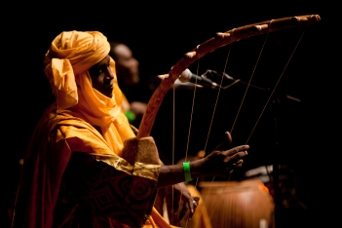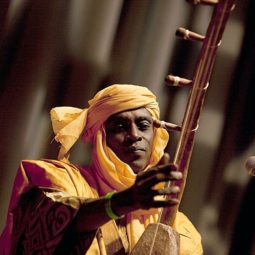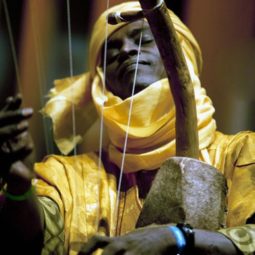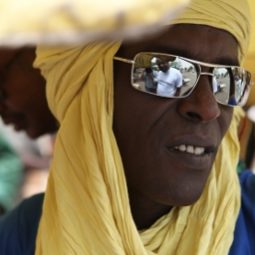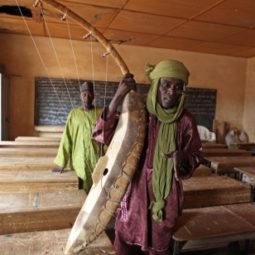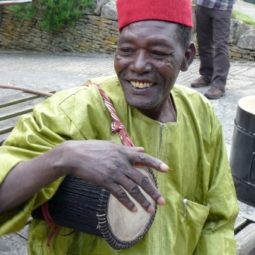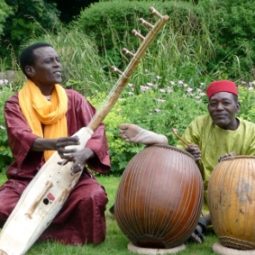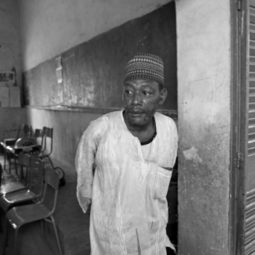Mamane Barka
‘A hypnotic triumph of last-ditch musicology’ Lucid Culture
A night in the company of Mamane Barka is a chance not just to experience a beautiful, forgotten music, but to hear the fascinating story of one man’s mission to save a sacred harp and the rich musical traditions of the Boudouma nomads from extinction.
Mamane Barka was born into a family of Toubou nomads and grew up to become a teacher and then a celebrated ngurumi player and pop musician in Niger. A decade ago Mamane heard about the beautiful sound of the biram, an enormous boat shaped 5-stringed harp sacred to the Boudouma people of Lake Chad. When he learnt there was only one elderly player of the instrument remaining Mamane went to live with the Boudouma to study with the old master to learn the instrument and to be initiated into it’s rituals and ancient mythical songs. On the death of the master, Mamane was bequeathed the biram and charged with bringing the biram to the attention of the wider world.
Now Mamane maintains the tradition by touring the world with master drummer Oumarou Adamou, the son of a Hausa griot, whose trance-inducing percussion is the bedrock of this extraordinarily powerful desert blues.
Short Resume
Desert bluesman keeping tradition alive
You have to wonder how many more unknown great musicians there are wandering nomadically around the Sahel playing those ol’ desert blues. Hot on the heels of the likes of Tinariwen and Etran Finatawa comes Niger’s Mamane Barka. A true son of the desert born into a family of Toubou nomads, he began playing a two-string traditional instrument called the gourmi but is now a master of an extraordinary instrument called the biram. A five-string, harp-like instrument shaped like a long wooden boat, the biram is sacred to the Boudouma people, a tribe of fishing nomads from eastern Niger on the shore of Lake Chad, and can only be played by initiated masters. When Mamane learnt that there was only one elderly player of the instrument left and that the Badouma youth had little interest in putting in the years of practice to learn, he moved to Lake Chad and became the student of the old man, learning the instrument and its rituals and ancient, mystical songs. Today he is believed to be the only master of the biram in all Niger.
Biog by Nigel Williamson
Mamane Barka and Oumarou Adamou
Mamane Barka is a charismatic musician and ethnomusicologist who is widely known in Niger as a virtuoso ugurumi player. Internationally, he is best known as the last master of the Biram, a sacred instrument of the Boudouma people that he learnt in order to save it from obscurity. Oumarou Adamou, the son of a Hausa Griot, is a famed percussionist and lifelong friend of Barka. Together, their swirling strings, driving rhythms and haunting vocals evoke the vast open spaces of the desert and the very soul of nomadic life.
Discography
Introducing Mamane Barka http://www.worldmusic.net/store/item/INTRO114/
Sleeve Notes:
This album is dedicated to the old master of the biram, Boukar Tar (also known as Koulli), and his family
During our meeting in 2004, Mamane Barka presented me with an enormous boat-shaped instrument with five strings. I was amazed when he started touching the strings, producing a sound exactly like water. I was immediately attracted to this instrument as if the ghost of Kargila, the spirit of Lake Chad, had taken possession of me! The three days of recording in London were unforgettable: during the recording session we could feel the spirit of Kargila in the studio. To find a biram in a very sophisticated and modern studio environment felt like opening the door to a new era. Hopefully the results will satisfy the spirit of Kargila, the Boudouma people and of course anyone who is lucky enough to be listening to this album. (Sandra van Edig)
As a nomad of the Toubou tribe, Malam Mamane Barka is the indisputable son of the desert. He was born in Tesker, in the eastern part of the Niger Republic, in 1959 and began his career as a teacher. In the 1980s and 1990s, he also played the ngurumi, a traditional string instrument, and thanks to his skills and charisma soon became a celebrated musician in Niger and Nigeria, landing him with the opportunity to travel all over the world to represent his country in various cultural events.
In 2002, Mamane Barka received a UNESCO scholarship to materialize his dream of reviving the tradition of the biram, the five-string harp. He travelled to Lake Chad in eastern Niger to meet the Boudouma, an ethnic group of nomadic fishermen, and their sacred instrument, the biram, which they believe is protected by the spirit of the lake, Kargila. True to its role as an integral part of the fishing tradition, the instrument resembles a boat.
At the time the only remaining master of the biram, Boukar Tar, was still alive, and Mamane Barka received a warm welcome from this old master who had thought his instrument had already seen its last days. After many rituals of purification, Boukar Tar agreed to teach Mamane Barka the secrets of the holy instrument and the lyrics of the mystical songs. Having inherited the knowledge of rituals and cultural heritage of the Boudouma, Mamane Barka received the master’s last biram as a gift. Handing over the instrument to his sucessor, Boukar Tar asked Mamane Barka to promote it all over the world. Since this meeting of great musical minds, Boukar Tar has passed away, making Mamane Barka the only master of the biram in the world. He is maintaining the tradition single-handedly, bringing the instrument to the attention of the wider world with his own blend of desert blues
In May 2005, Malam Mamane Barka was invited to perform at the Desert Music Festival in Rissani, Morocco, which was the first time the biram had been taken outside its home country. The instrument was well received by the public, and more concerts abroad followed, including events in France and Germany. Thomas Brooman from WOMAD invited Mamane to perform at the UK festival in 2008, along with percussionist Oumarou Adamou, who was born the son of a Hausa griot in the city of Maradi, in southern Niger close to the Nigerian border. The two musicians had known each other for years, and decided to form the current ensemble in 2006. In July 2008, just after their successful appearance at WOMAD, the recording began at London’s Livingston Studios with producer Paul Borg. With Oumarou’s percussion this album is not only paying respect to the spiritual biram, but is also an homage to the traditional percussive instruments of the rich Nigerien culture: the douma (the spiritual drum), the kalangou and the calabash.
Most of the songs are traditional Boudouma songs that talk about the life of the ancestors, about the spirits, and the animals the nomads live with: camels, cows, goats, fish and birds. They often describe the beauty of the water in the lake or of the desert, and the braveness of the warriors. Mamane Barka has also added some new compositions: songs which deliver messages to the youth, songs about the respect for the elders and also reflections of the ever-changing society. He sings in the boudouma language as well as in Hausa, Toubou and Kanuri, all languages spoken in Niger. One of the most moving songs, ‘Boulanga’, is a song full of loneliness; a tragic and emotional story about an old man who misses his friends who have died before him. A woman in Doro Lelewa had a recording of this track performed by the old master Boukar Tar, and she gave it to Mamane Barka as a gift when he was visiting in 2006. Mamane studied the lyrics and the sophisticated way of playing the biram for several months to create a perfect composition, and on this recording the producer Paul Borg has excelled in producing a sound resembling the old master himself sitting in his empty courtyard in a Boudama village thinking about his friends.
Short Resume
Desert bluesman keeping tradition alive
You have to wonder how many more unknown great musicians there are wandering nomadically around the Sahel playing those ol’ desert blues. Hot on the heels of the likes of Tinariwen and Etran Finatawa comes Niger’s Mamane Barka. A true son of the desert born into a family of Toubou nomads, he began playing a two-string traditional instrument called the gourmi but is now a master of an extraordinary instrument called the biram. A five-string, harp-like instrument shaped like a long wooden boat, the biram is sacred to the Boudouma people, a tribe of fishing nomads from eastern Niger on the shore of Lake Chad, and can only be played by initiated masters. When Mamane learnt that there was only one elderly player of the instrument left and that the Badouma youth had little interest in putting in the years of practice to learn, he moved to Lake Chad and became the student of the old man, learning the instrument and its rituals and ancient, mystical songs. Today he is believed to be the only master of the biram in all Niger.
Biog by Nigel Williamson for WOMAD
Please contact AAA for hi res versions of the images below.

Feature in fRoots Jan 2009
Click here to download.
MySpace – www.myspace.com/mamanebarka
Official Website – www.mamanebarka.com
Click HERE to download a copy of the Mamane Barka Ensemble Tech Spec
Oumarou Adamou
Workshop at Musicport
The Endless Journey featuring Manane & Oumarou
The Smugglers Session
Wo Kuru
